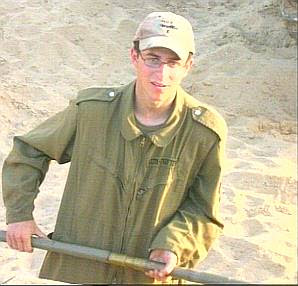You don't say: Hamas keeping Shalit as 'insurance'
 'Defense sources' told the Jerusalem Post over the weekend that while Israel agonizes over how much to loosen the definition of 'blood on their hands' to permit the release of 'Palestinian' terrorists in exchange for kidnapped IDF soldier Gilad Shalit (pictured, top left), Hamas may be planning to keep Shalit anyway as an 'insurance policy' for its leadership:
'Defense sources' told the Jerusalem Post over the weekend that while Israel agonizes over how much to loosen the definition of 'blood on their hands' to permit the release of 'Palestinian' terrorists in exchange for kidnapped IDF soldier Gilad Shalit (pictured, top left), Hamas may be planning to keep Shalit anyway as an 'insurance policy' for its leadership: Defense sources told The Jerusalem Post over the weekend that senior Hamas leaders regard holding Schalit, who was kidnapped on the Israeli side of the Gaza border in June 2006, as a kind of protection from IDF attacks on them.Well it certainly took them long enough to figure that out!
"Schalit is an insurance card for the senior Hamas leaders - that as long as they hold him, Israel will not assassinate them," one defense official said. "The moment he is released, [in the Hamas conception] there is nothing holding us back."
Last week's Winograd Committee final report on the Second Lebanon War strongly urged that Israel not make "crazy deals" to secure the release of captured soldiers, since this only boosts terrorists' motivation to capture more.Why should the government listen to that when it hasn't listened to anything else that Winograd said? (Yes, that was a rhetorical question, and yes, I think the government should be listening to Winograd, but it won't).
In a chapter devoted to the dilemmas of such exchanges, the Winograd Committee strongly warned against "crazy deals" in negotiations with terrorists that would only increase their motivation to abduct soldiers, and urged Israel to formulate a clear policy for dealing with instances of kidnapped soldiers.Gee, I wonder where the US got that policy....
In the chapter "Kidnapping - A Strategic Threat," the Winograd panel said the lack of a formulated policy on how to deal with abductions of soldier was "a strategic mistake and even weakens Israel. As long as we appear vulnerable," it went on, "the price for the return of the soldier is higher and the motivation to kidnap additional soldiers increases."
The report admiringly cited the US's declared policy of not negotiating with terrorists as having minimized the number of attempts to kidnap American soldiers. The Winograd Committee recommended that Israel engage in a dialogue with its allies and formulate a joint policy that would enjoy international legitimacy as well as global cooperation.
There are two ways out of this dilemma. Either you do an exchange at an outrageous price and you set the stage for more kidnappings and more ransom demands and more murders of Israelis, or you decide that you aren't going to jeopardize more Israeli lives for one soldier, and you tell Hamas that there are no negotiations and we will strike at your leadership in any time, place or manner that we see fit. And you do it.
As cruel as this sounds, Shalit is one soldier, the country has to come ahead of him, and regardless of what Israel does, he's worth nothing to Hamas dead (unless we do an exchange of terrorists for a body - which is even worse than exchanging a terrorist for a live soldier) but he may always be worth something to them alive.









3 Comments:
This comment has been removed by the author.
Hamas has no incentive to do a deal with Israel. Holding a country's security hostage over the fate of one man is meshuggeneh. Its even worse jeopardizing the safety of the rest of the Jewish people for the sake of the man and if I was the one in Gilad Shalit's place, I would not want Israel to do everything to free me since my blood is not redder than that of my fellow Jews and Israel has no right to endanger their lives for my freedom.
Terrorists should not be rewarded. Israel should fight Hamas as if Shalit was never their prisoner and destroy them. But common sense is the last thing one can expect today of an Israeli government whose guiding line is not what is best for the country's welfare but what best serves its political survival.
Hamas may be a group of fanatics but they also understand this Israeli govermment far better than the Israeli government understands itself - or the enemy.
To Norman:
I can hear what you are saying if you are implying that we shouldn't overextend ourselves in releasing prisoners. After all, if I am willing to shell out a million bucks for a prisoner, I am effectively setting a bounty on my own people!
On the other hand, we aren't dogs to be forgotten. We should make reasonable efforts to secure prisoners, whether by offering monetary rewards (positive reinforcement), or threatening to destroy our enemies in fury (negative reinforcement).
Whatever works.
Post a Comment
<< Home